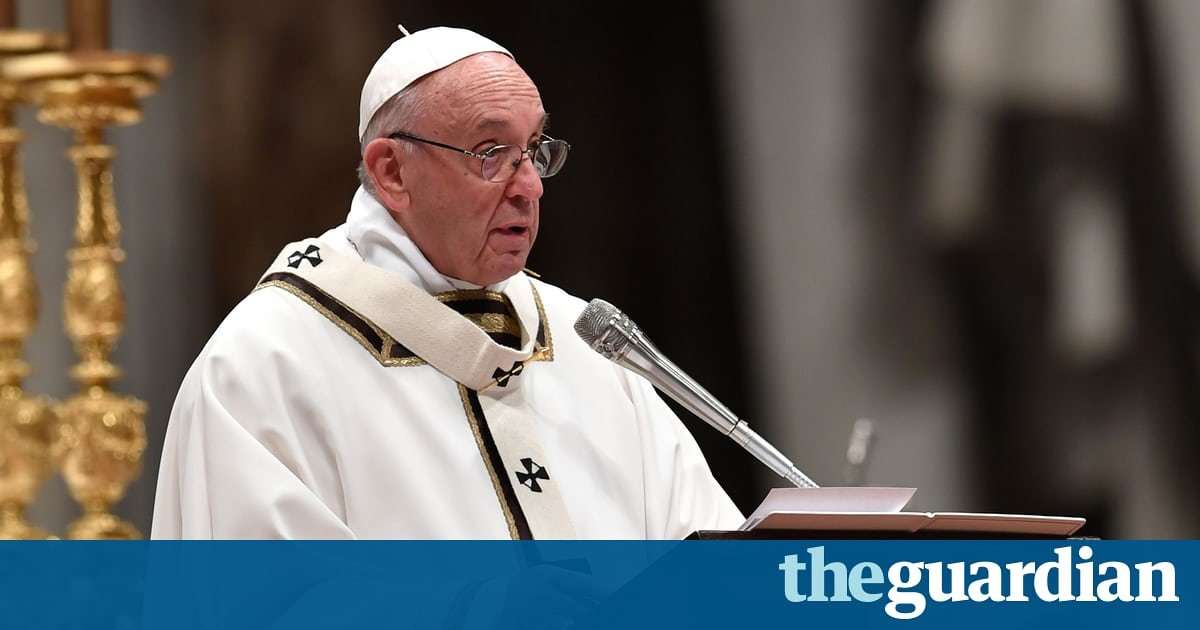Francis uses Christmas Eve mass to express hope that no one should feel ‘there is no room for them’ and urges faithful to turn fear into charity
Pope Francis has likened the journey of Mary and Joseph to Bethlehem to the migrations of millions of people today who are forced to leave homelands for a better life, or just for survival, and he expressed hope that no one will feel “there is no room for them on this Earth”.
Francis celebrated Christmas vigil mass on Sunday in the splendour of St Peter’s Basilica, telling the faithful that the “simple story” of Jesus’ birth in a manger changed “our history forever. Everything that night became a source of hope.”
Noting that Mary and Joseph arrived in a land “where there was no place for them”, Francis drew parallels with today.
Pope shines as Trump fails test of leadership on migrants and refugees | Letter Read more
“So many other footsteps are hidden in the footsteps of Joseph and Mary,” he said in his homily. “We see the tracks of entire families forced to set out in our own day. We see the tracks of millions of persons who do not choose to go away but, driven from their land, leave behind their dear ones.”
Francis has made concern for economic migrants, war refugees and others on society’s margins a central plank of his papacy. He said God is present in “the unwelcomed visitor, often unrecognisable, who walks through our cities and our neighbourhoods, who travels on our buses and knocks on our door”. That perception of God should develop into “new forms of relationship, in which none have to feel that there is no room for them on this Earth”, he said.
“Christmas is a time for turning the power of fear into the power of charity,” Francis said.
At midday Monday, tradition calls for Francis to deliver the Christmas Day message “urbi et orbi” – Latin for “to the city and to the world” – from the central loggia of the basilica overlooking St Peter’s Square.

love_unknown on December 25th, 2017 at 05:05 UTC »
Several comments in this thread have dismissed the identification of the Holy Family with migrants by highlighting the fact that, in Luke's recounting of the nativity story, Joseph is actually returning to his hometown in order to fulfill the census obligations. While this is true, it is worth noting that it is effectively impossible to read the Bible with any degree of attentiveness without realizing that the figure identified as God's son is always forced into migratory situations. In the Hebrew Bible — what for Christians is the Old Testament — it is the people Israel that is identified as God's firstborn son, and the Israelites, obviously, become migrants on multiple occasions: when, in order to escape a famine, the sons of Israel migrate to Egypt and are given provisions by the unexpectedly alive Joseph; when to escape slavery the Israelites migrate, through the desert, into the promised land; when they are exiled from the land to Babylon; and when they return from Babylon into the land. In the New Testament, the figure now identified as God's son — Jesus, who himself 'embodies' Israel as its king — is also forced into similar migratory situations. He, like the sons of Israel before him, migrates into Egypt to flee the violence of King Herod and returns back to the land; and his ministry is all about announcing the Kingdom, which meant an (admittedly non-geographical) migration from the desperation of sin to a promised land of grace.
The Church has always believed that God is particularly present in the poor, the lowly, the humble, the oppressed. And with regard to migrants, the almost inescapable conclusion is that God identifies with them in a unique way — not only because he cares especially for those in dire situations (though he does), but rather also because God, in his people Israel and in the person of Jesus, was himself a migrant. So the pope is of course right. In the faces of the millions of people today who are forced to leave their violence-torn or famine-stricken homelands, we see the story of salvation recapitulated: in the faces of the hungry and destitute we see the starving sons of Israel fleeing to Egypt to find food; in those fleeing war we see Israel dispersed from the land following military conquest; and in those escaping political persecution we see the boy Jesus fleeing for his life at the hands of an oppressive dictator. In other words, in the faces of today's migrants we see the son of God. How could it possibly be otherwise?
AllHailTheMadOx on December 25th, 2017 at 04:24 UTC »
While I understand the sentiment behind this statement, the fact that Joseph was actually returning to his hometown (Bethlehem) to participate in a census decreed by Caesar Augustus makes the statement kind of ironic.
Source: Chapter 2 of the Book of Luke
zeusssssss on December 25th, 2017 at 01:27 UTC »
Sure, you can come in, just know you are not in your country anymore and adapt to us not vice versa